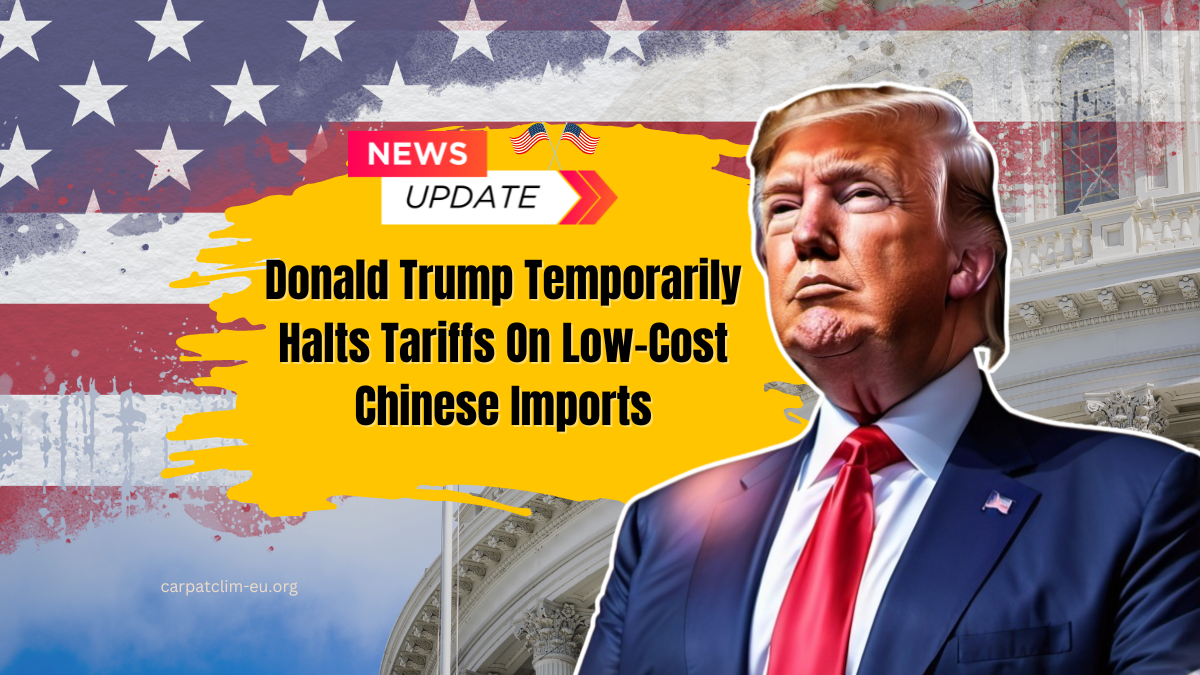Latest News
Donald Trump Temporarily Halts Tariffs On Low-Cost Chinese Imports

The U.S.-China trade conflict has taken a new turn as Donald Trump has decided to temporarily suspend new tariffs on low-cost shipments from China.
This pause comes as U.S. officials work on developing an effective taxation system for the millions of packages that arrive daily in the United States.
Temporary Suspension of De Minimis Tariff Exemption
In an amendment to an executive order signed on Wednesday and published on Friday, the White House announced that the de minimis provision would remain intact until the U.S. government establishes systems to efficiently process and collect tariff revenue.
The de minimis threshold exempts shipments valued at under $800 from tariffs and stringent customs inspections.
Initially, Trump had revoked this exemption as part of a broader 10% tariff increase on Chinese imports, which aimed to penalize China for its role in the illicit fentanyl trade in the U.S.
However, despite the temporary reprieve on low-value packages, the rest of the new tariffs remain in place.
China’s Retaliatory Tariffs and Trade Tensions
In response to the U.S. tariffs, China imposed 10-15% tariffs on key American exports, including:
- Liquefied Natural Gas (LNG)
- Coal
- Crude Oil
- Farm Equipment
These retaliatory measures are scheduled to take effect on Monday. Trump, however, has stated that he is in “no rush” to negotiate with Chinese officials regarding the ongoing trade dispute.
Impact on E-Commerce and U.S. Customs
The de minimis exemption was designed to help U.S. consumers and small businesses access affordable international products without undergoing complicated customs processes.
Over time, it has significantly benefited major Chinese e-commerce platforms, such as:
- Shein
- Temu
If the exemption were removed, U.S. Customs and Border Protection (CBP) officials would have to apply a more complex formal entry process to each low-value shipment from China.
| Category | Estimated Daily Volume |
|---|---|
| Total Low-Value Shipments | 4 million+ |
| Shipments from Shein & Temu | 30% of total volume |
A 2023 congressional report indicated that 30% of these shipments come from Temu and Shein, underscoring their reliance on the de minimis rule.
Complications for Logistics and Postal Services
The sudden enforcement of tariffs led to widespread disruptions in logistics:
- USPS initially halted package intake from China (including Hong Kong) on Tuesday.
- USPS reversed this decision on Wednesday and resumed shipments after consultations with customs officials.
- Chinese e-commerce sellers reported that logistics providers were charging withholding fees to cover additional levies and customs expenses.
To address these challenges, U.S. Postal Service and customs officials are working to develop an “efficient collection mechanism” that ensures smooth package processing without overwhelming customs officials.
Domestic Retailers and Government Scrutiny on De Minimis Rules
For years, U.S. retailers have argued that the de minimis provision gives Chinese e-commerce platforms an unfair cost advantage.
These retailers, who import goods in bulk, must adhere to higher duties, making their products more expensive than those shipped directly from China under the de minimis threshold.
Previous Efforts to Modify De Minimis Rules
- The Biden administration had earlier explored revisions to tighten the de minimis regulation.
- Analysts estimate that in 2024, China exported $46 billion worth of products under this provision.
- Eliminating the de minimis exemption could reduce China’s GDP by 0.2% in 2025 (according to Nomura, a Japanese investment bank).
The temporary suspension of tariffs on low-cost parcels offers a short-term reprieve in the U.S.-China trade dispute, but uncertainties remain.
While the White House strategizes on a system to efficiently process and collect tariffs, Chinese e-commerce giants Shein and Temu continue to dominate the market, benefiting from the de minimis exemption.
Meanwhile, domestic retailers and logistics providers await long-term regulatory decisions that could reshape international e-commerce dynamics.
FAQs
What is the de minimis provision, and why is it important?
The de minimis provision allows goods valued at under $800 to enter the U.S. without tariffs or extensive customs procedures. It benefits consumers by providing access to affordable international products and streamlines shipping processes for major e-commerce retailers.
Why did Donald Trump initially revoke the exemption?
Trump revoked the de minimis provision as part of a broader 10% tariff increase on Chinese goods, aiming to penalize China for its alleged role in fentanyl trafficking into the U.S.
How does the exemption impact platforms like Shein and Temu?
Shein and Temu ship low-cost goods directly to U.S. consumers under the de minimis exemption. If removed, they would face higher tariffs and customs processing requirements, potentially increasing prices for customers.
-

 US Coins1 day ago
US Coins1 day agoThe 1917-S Buffalo Nickel: A Rare Gem Fetching Over $60K
-

 Social Security2 days ago
Social Security2 days agoSocial Security- February 19 Payment for Beneficiaries Born from the 11th to the 20th
-

 Social Security2 weeks ago
Social Security2 weeks agoWho Will Qualify The $2000 Social Security Payment, February 12?
-

 US Coins2 weeks ago
US Coins2 weeks agoRare 1943 Copper Lincoln Wheat Penny Worth $2.5 Million, Still In Circulation
-

 Personal Finance2 weeks ago
Personal Finance2 weeks ago1964 JFK Half-Dollar Coins Fetch Over $150,000 At Auction
-

 Latest News1 day ago
Latest News1 day ago$1,500 Child Stimulus Direct Deposits In February 2025- Eligibility And Payment Details
-

 Social Security2 weeks ago
Social Security2 weeks ago2 Reasons Your Social Security Payments Could Be Reduced as an SSDI Beneficiary
-

 Latest News2 weeks ago
Latest News2 weeks agoSocial Security Payments Up To $5,108 Begin This Week – Check Your Eligibility Now!











